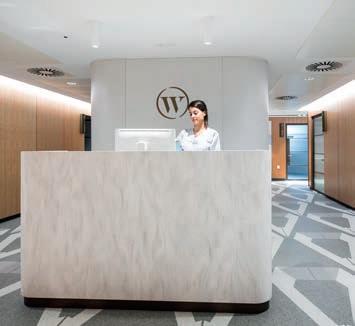
6 minute read
COMMITTED TO A BETTER PATIENT EXPERIENCE
Consultant Gastroenterologist
Professor Julian Teare
talks about how the
OneWelbeck Digestive Health Centre is focused on providing the best possible patient experience
What is your medical specialty and on what areas are you focused?
I am a gastroenterologist, so I have a special interest in diseases of the gut. My main interest is diseases of the stomach: stomach ulceration, refl ux disease and diseases of the colon, colitis, Crohn's disease and bowel cancer. When we investigate for these diseases, we’re looking for signs of infl ammation, for those with colitis and Crohn's disease, and for polyps and bowel cancer. One of the big developments over the past decade or more has been to screen people in their 50s to fi nd polyps, because for 95% of people that have bowel cancer, it begins with a polyp.
These polyps increase in size over many years and can turn into cancer, so if polyps are detected and removed then we can prevent the development of the disease. In countries that have adopted screening programmes with colonoscopy – such as the United States, where about half the population has been screened – instances of colon cancer have fallen by more than 40%.
I also have a research laboratory where we investigate what drives the formation of polyps and what leads some polyps to turn into bowel cancer. About 40% of people at colonoscopy have a polyp, and most of these will never develop into cancer. For those polyps that do develop into cancer, we are exploring why this occurs – for instance, something present in the gut or for dietary reasons.
Statistics show that a case of bowel cancer is found in every 121 procedures, and that the disease is prevented with
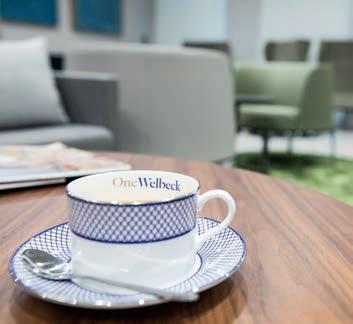
2
every 28 procedures. One in 15 men and one in 18 women will develop bowel cancer during their lifetimes.
What was the thinking behind the creation of the OneWelbeck Digestive Health Centre?
In central London we have large groups of doctors working in this discipline. We all know each other, we have trained together, and some of the younger doctors have been trained within our group. An opportunity arose with OneWelbeck to look at how we could provide the best possible standard of care and patient experience.
At many hospitals, we found that clinics were crowded and oered little privacy, where patients were waiting in a cubicle before going into the procedure room and didn’t have access to en suite toilet facilities. In exploring how to make the procedure as easy as possible, we visited various centres around the world, including the United States and Sweden.
We met with Welbeck Health and started conversations about how we could work together to create something better, where our group could become investors in the centre and choose the doctors we wanted to work with – people we trust.
We started with a group of five to 10, and this has now grown to 25 people providing what, I think, is the optimum experience in central London for having an endoscopy. We saw our first patient in July 2019 and, so far, we’ve seen more than 1,000 patients and carried out around 1,300 procedures. We’ve created a place that is calm, quiet and reassuring for patients.
Can you describe a typical patient endoscopy experience at OneWelbeck Digestive Health?
The point in choosing the endoscopists we have is that they are adept and skilled. Many procedures can be carried out without sedation, so the patient can see what is happening on the screen as it happens. Our patient feedback tells us that people find this really interesting.
For patients who are nervous and would prefer to be sedated, an anaesthetist can administer a drug called propofol, which is a sedative agent from which people recover very quickly – within minutes you're awake and feel completely normal. It’s a very gentle experience. Discomfort and pain should not be part of the process. People might read about such procedures online and think it will be a horrible experience, but it doesn’t have to be.
A key development in improving patients’ experience of such procedures is the technology we use. Our instruments work with an external scope guide – each has an electromagnetic coil within the shaft that enables us to see how
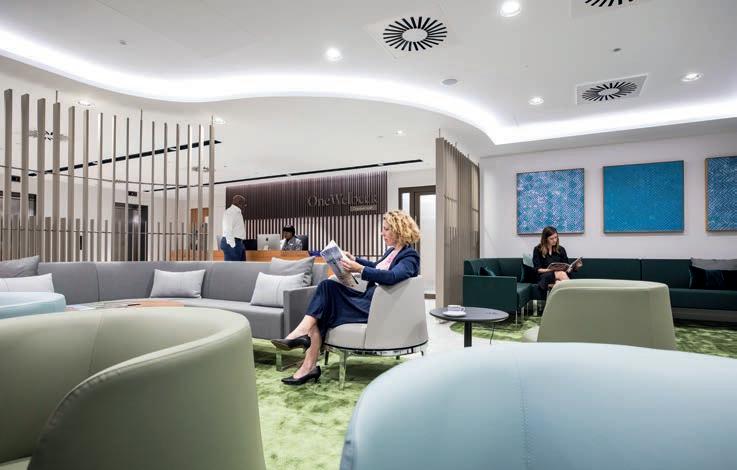
3
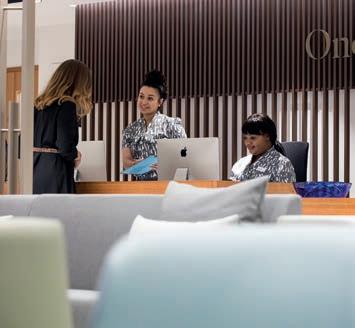
1-5 The facilities at OneWelbeck's Digestive Health Centre are designed to make patient visits as comfortable and pleasant as possible (PHOTOS: SIMON JARRATT)
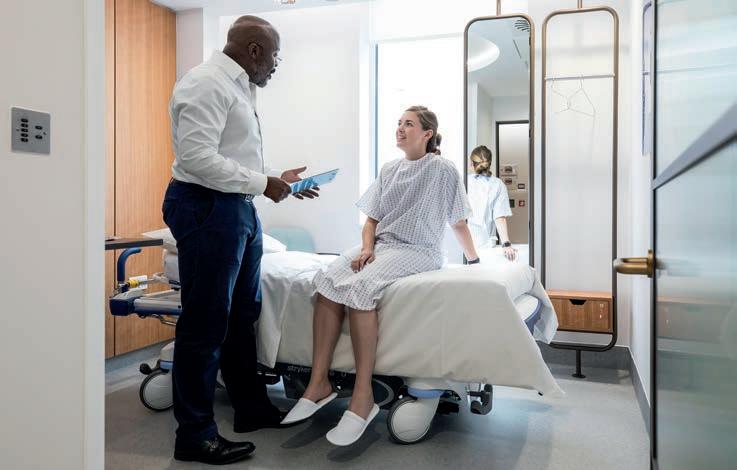
the instrument is moving around inside, allowing us to keep the instrument straight and, therefore, reduce any discomfort.
Are there alternative tests for detecting polyps?
Most people, of course, would prefer not to have an invasive test if it can be avoided. Alternatives can include a blood-in-the-stool test, which can identify polyps so that we know whether the person coming for the procedure is likely to have the polyps that we could remove, as they are at higher risk of the polyps developing into cancer. There are also faecal immunohistochemical tests, where we can look for molecules that can identify risk and detect polyps. We can also find polyps with a virtual colonoscopy or CT colonography, which also allows for assessing structures outside of the colon.
What does the future hold for the detection and prevention of bowel cancer in the UK?
The goal, of course, is to reduce the likelihood or the incidence of colon cancer in the population, so faecal immunohistochemical tests will come in as there simply aren't enough people trained in a population the size of the UK’s to be able to provide the endoscopy required. One of our endoscopists is the head of the UK’s national background screening programme, and another two run the hub centres in dierent hospitals around central London. We are all committed to the process, committed to trying to reduce the incidences of bowel cancer in our populations, as well as what we can do for individuals.
How do you feel as the OneWelbeck Digestive Health Centre completes its first year in operation?
Immensely proud. We have this enormous pride in our environment, as we have invested in the centre. We were involved at each stage of the design process to create the best experience for us and for the patients.
It is a completely new model that is very exciting and works really well. One of the important things about working as a group is that we are now invested in each other's success. Often, doctors in private healthcare find themselves in competition with each other, whereas in this environment we’re in collaboration. We are enabling each other to flourish and supporting each other.
The model extends throughout OneWelbeck, including heart and chest specialists, endocrinologists, rheumatologists, orthopaedic surgeons, sports medicine physicians, physiotherapists, women's health specialists, and ear, nose and throat clinicians. By summer 2020, we expect the OneWelbeck team to expand to around 200 people.
5
